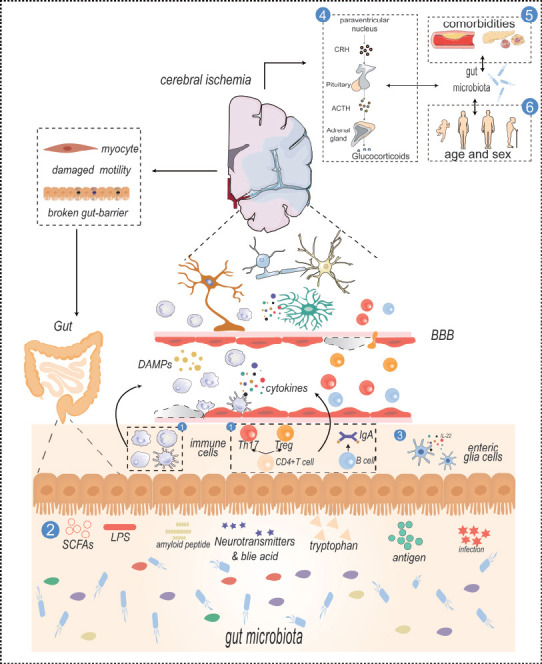Figure 2.

The gut-brain axis in ischemic stroke.
① Immune cells including NK cells, neutrophils, and adaptive immune cells stimulated by cytokines or brain-derived antigens will circulate in the blood and cross the BBB to take part in neuroinflammation. ② Gut metabolites, except LPS which is a membrane component of gut microbiota, SCFAs, and tryptophan are generated by specific gut microbiomes that contribute to various effects like the activation of astrocytes or microglia. ③ Gut enteric cells release IL-22 to form a bidirectional communication and maintain the gut barrier integrity. ④ HPA axis plays an important role in ischemic stroke. Gut microbiota can affect the release of hormones, and hormones can also affect the composition of gut microbiota. ⑤ and ⑥ Comorbidities, age, sex, plaque formation in atherosclerosis, and insulin resistance in diabetes are related to gut microbiota, and the composition of gut microbiota is also different in different ages and sex. These factors are related to the onset of ischemic stroke. The prominent influences of interfering gut myocytes and gut barrier caused by the brain are drawn on the left. Created with Adobe Illustrator 2019. ACTH: Adrenocorticotropic hormone; BBB: blood-brain barrier; CRH: corticotropin-releasing hormone; DAMP: damage-associated molecular pattern; HPA: hypothalamic-pituitary-adrenal; IgA: immunoglobulin A; IL-22: interleukin-22; LPS: lipopolysaccharide; NK cells: natural killer cells; SCFA: short-chain fatty acid; Th17: T helper type 17 cell; Treg: regulatory T cell.
